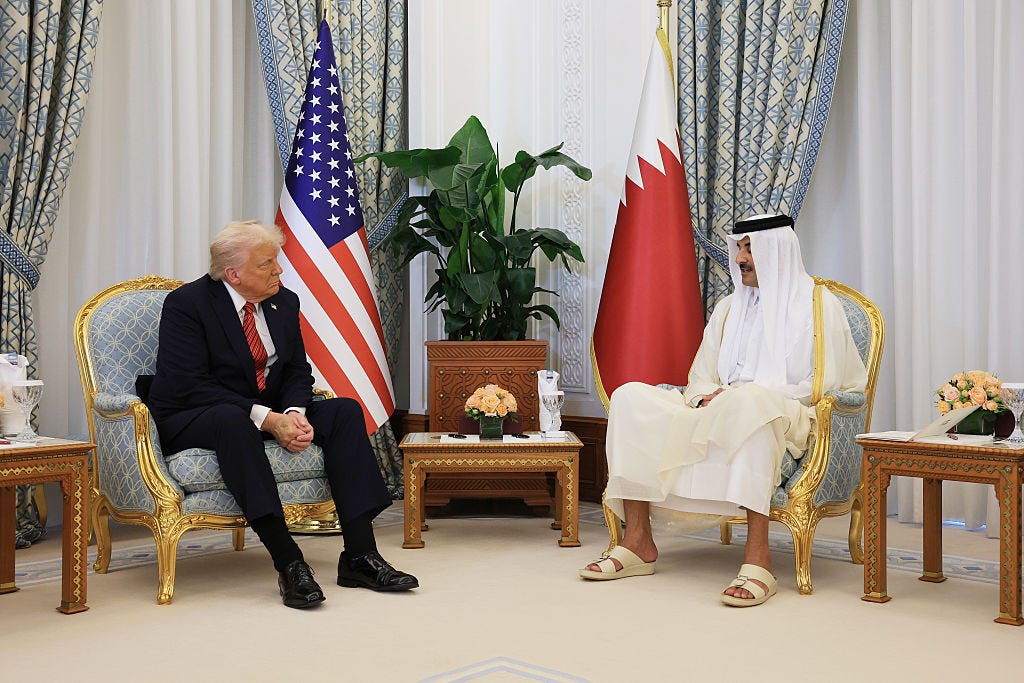|
 |
Nations that have bestowed lavish gifts to President Trump — or enriched Trump and his family by striking business deals with Trump-connected companies — have later received extraordinary benefits from the Trump administration. The apparent link between personal benefits and official acts has fundamentally changed the nature of the most powerful political office on Earth.
For example, on May 21, Qatar gifted the United States government a luxury 747 jet, which originally cost over $400 million, for Trump to use as Air Force One. The plane was designed by “famed French interior design firm Alberto Pinto Cabinet, and boasts gold-colored walls and gold furnishings, reminiscent of the president’s opulent home in Trump Tower.” The cabin “is decked out with winding staircases, plush carpeting, leather couches and more.” After Trump leaves office, the plane will reportedly be transferred to the Trump Presidential Library, making it available for Trump’s personal use.
In 2017, during his first term, Trump described Qatar as “a funder of terrorism at a very high level.” Since the gift of the plane, however, Trump’s posture toward Qatar has changed dramatically.
In a September 29 executive order, Trump describes Qatar as “a steadfast ally in pursuit of peace, stability, and prosperity, both in the Middle East and abroad.” Trump states that it is now “the policy of the United States to guarantee the security and territorial integrity of the State of Qatar against external attack.” Specifically, the “United States shall regard any armed attack on the territory, sovereignty, or critical infrastructure of the State of Qatar as a threat to the peace and security of the United States.” Such an expansive security guarantee was previously extended only to NATO members.
But Trump did not stop there. On October 10, Secretary of Defense Pete Hegseth announced that the government will permit Qatar to establish a military presence on U.S. soil. The Qatari government thanked Hegseth for allowing the creation of “a Qatar Emiri Air Force facility at Mountain Home Air Base in Idaho.” The facility “will host Qatari F-15 fighter jets and pilots who will train alongside U.S. troops.”
In 2024, a few months before Trump won the presidency, the Qatari government was one of two investors in a $1.5 billion funding round for Affinity Partners, an investment firm founded by Trump’s son-in-law, Jared Kushner. Although Kushner had pledged not to be involved in policy-making in Trump’s second term, he has reemerged as one of Trump’s top foreign policy advisors.
Several other countries have replicated Qatar’s financial approach to Trump and his family. It has paid off.
The UAE’s audacious crypto play
In May, the United Arab Emirates (UAE), through its state-backed investment fund MGX, purchased $2 billion worth of USD1, a stablecoin issued by a Trump-connected crypto firm World Liberty Financial (WLF). Stablecoin issuers make money by charging fees for issuing coins and earning interest on the assets held in reserve. The $2 billion purchase should generate tens of millions annually for WLF. Trump and his family members own about 38% of the company.
MGX purchased $2 billion in USD1 two weeks before WLF publicly announced the issuance of the coin. MGX then used the stablecoins to invest $2 billion in Binance, a crypto trading platform. It’s unclear what benefit MGX received from routing its investment through USD1, but the transaction did give “legitimacy and scale“ to the newly launched stablecoin.
Two weeks after the UAE’s massive USD1 purchase, the Trump administration agreed “to allow the U.A.E. access to hundreds of thousands of the world’s most advanced and scarce computer chips.” According to the New York Times, the same Emirati royal, Sheikh Tahnoon bin Zayed Al Nahyan, both made the decision to purchase USD1 and secured the agreement to acquire advanced computer chips. The federal government had previously rejected Tahnoon’s requests to purchase advanced chips due to concerns about his ties to China.
Steve Witkoff, Trump’s envoy to the Middle East, negotiated the computer chip agreement. Witkoff also has an ownership stake in WLF. (The White House says he is in the process of divesting.) Witkoff’s son, Zach Witkoff, is CEO of WLF.
In 2024, the UAE, through its Lunate investment fund, joined Qatar in the $1.5 billion investment in Kushner’s Affinity Partners.
A Saudi-financed Trump Tower
Shortly after Trump left the White House, the Saudi Public Investment Fund (PIF) invested $2 billion in Affinity Partners. In January, Kushner funneled a portion of that money to the Trump Organization, announcing the construction of a Trump-branded luxury hotel and apartment complex in Belgrade, Serbia. The complex, known as Trump Tower Belgrade, will have 175 hotel rooms and sell 1,500 residences.
Meanwhile, the Saudi-owned LIV Golf tour has partnered extensively with the Trump Organization. The tour has held events at Trump courses in every season since its founding in 2022, including a tournament at Trump National Doral in April 2025. The partnership with LIV Golf, which brings golf superstars to Trump properties, has coincided with a “jump in golf revenues“ at Trump courses.
In May, the Trump administration agreed “to sell Saudi Arabia an arms package worth nearly $142 billion.” While previous arms sales to Saudi Arabia were smaller and focused on defensive weaponry, the Trump deal was expansive, including “state-of-the-art warfighting equipment and services from over a dozen U.S. defense firms.” The package also “includes extensive training and support” from the U.S. military to “build the capacity of the Saudi armed forces.” A White House fact sheet described the agreement as “historic,” saying it represents “a new golden era of partnership between the United States and Saudi Arabia.”
I’ll be direct: the information landscape in the United States has reached a crisis point. Billionaires are using the social media platforms and media outlets they control to curry favor with Trump.
Google just paid Trump $25 billion to settle a bogus lawsuit.
Jeff Bezos is purging Trump critics from the opinion section of the Washington Post.
